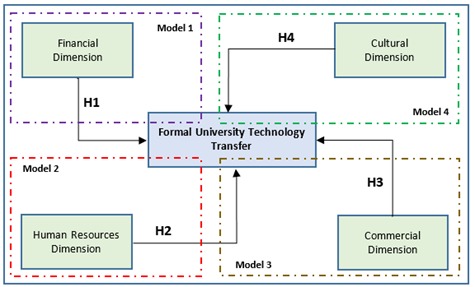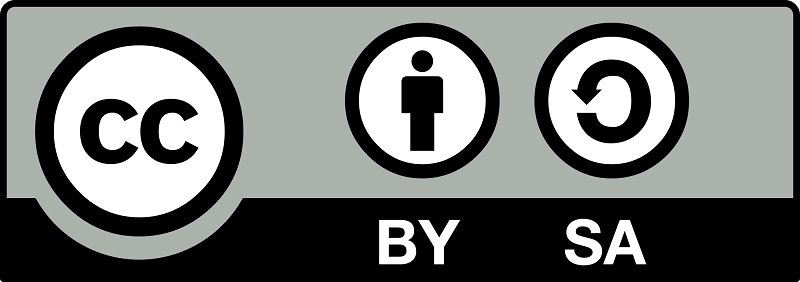
DOI:
https://doi.org/10.14483/22487638.19706Publicado:
26-07-2024Número:
Vol. 27 Núm. 78 (2023): Octubre - DiciembreSección:
InvestigaciónFactors influencing University Technological Transfer in Colombia
Determinantes de la Transferencia Tecnológica Universitaria en Colombia
Palabras clave:
technology transfer, structural equations, resources (en).Palabras clave:
transferencia tecnológica, ecuaciones estructurales, recursos (es).Descargas
Resumen (en)
The formal university technology transfer (TTU) in Colombia can contribute significantly to the country’s economic development. Based on the Theory of Resources and Capacities, this paper investigates the determinants of transfer in Colombian public and private universities. For this, we used structural equations methodology from data collected through a survey of 20 Colombian universities. The results of the estimates empirically confirm the significance of the financial, commercial, cultural, and human dimensions in the technology transfer process. Among the main factors that positively influence the TTU are: 1. the importance of external financial resources, 2. having a technological portfolio, 3. the time that transfer activities have been carried out, and 4. the people in charge’s experience.: The study shows us that it is necessary to strengthen policies within universities and improve their articulation with firms to achieve more successful technology transfer processes.
Resumen (es)
La transferencia tecnológica universitaria (TTU) formal en Colombia puede contribuir de manera significativa al desarrollo económico del país. Basado en la Teoría de los Recursos y las Capacidades, este trabajo investiga los determinantes de la transferencia en las universidades públicas y privadas colombianas. Para esto, es utilizada la metodología de ecuaciones estructurales a partir de datos recopilados mediante una encuesta a 20 universidades colombianas. Los resultados de las estimaciones confirman empíricamente la significancia de las dimensiones financiera, comercial, cultural y humana en el proceso de transferencia tecnológica. Entre los principales factores que influyen positivamente en la TTU, se encontró: 1. la importancia que tienen los recursos financieros externos, 2. el contar con un portafolio tecnológico, 3. el tiempo que se lleva realizando actividades de transferencia y 4. la experiencia de las personas encargadas. El estudio nos muestra que es necesario fortalecer las políticas al interior de las universidades y mejorar su articulación con las empresas para lograr procesos de transferencia tecnológica más exitosos.
Referencias
Algieri, B., Aquino, M., & Sucurro, M. (2013). Technology transfer offices and academic spin-off creation: the case of Italy. The Journal of Technology Transfer, Springer, 38(4), 382-400.
Andrade, R., Fernandes, G., & Tereso, A. (2016). Benefits Management in University-Industry R&D Collaborative Projects: A Review on Benefits and Success Factors. Procedia Computer Science, 100, 921-927. https://doi.org/10.1016/j.procs.2016.09.249
Arechavala, R., & Sanchez, C. (2017). Las universidades públicas mexicanas: los retos de las transformaciones institucionales hacia la investigación y la transferencia de conocimiento. Revista de la educación superior, 46(184), 21-37. https://dx.doi.org/10.1016/j.resu.2017.09.001
Arias, J., & Aristizábal, C. (2011). Transferencia de conocimiento orientada a la innovación social en la relación ciencia-tecnología y sociedad. Revista científica Pensamiento y Gestión, (31).
Audretsch, D., & Link, A. (2017). Universities and the entrepreneurial ecosystem. Cheltenham, UK: Edward Elgar Publishing.
Audretsch, D., Lehmann, E., & Warning, S. (2005). University spillovers and new firm location. Research Policy, 34(7), 1113-1122.
Bentler, P., & Chou, C. (1987). Practical Issues in Structural Modeling. Sociological Methods and Research, 16(1), 78-117.
Berbegal, J., Sánchez, J., & Ribeiro, E. (Julio de 2015). University–industry partnerships for the provision of R&D services. Journal of Business Research, 68(7), 1407-1413. https://doi.org/10.1016/j.jbusres.2015.01.023
Bessette, R. (2003). Measuring the economic impact of university-based research. Journal of Technology Transfer, 28(3 - 4), 355-361.
Bound, J., Braga, B., Khanna, G., & Turner, S. (2019). Public Universities: The Supply Side of Building a Skilled Workforce. The Russell Sage Foundation Journal of the Social Sciences, 5(5), 43-66.
Caldera, A., & Debande, O. (2010). Performance of Spanish universities in technology transfer: An empirical analysis. Research Policy, 39, 1160-1173.
Cassiman, B., Di Guardo, M., & Valentini, G. (2010). Organizing links with science: Cooperate or contract? A project-level analysis. Research Policy, 39(7), 882-892.
Chang, Y., Chen, M., Hua, M., & Yang, P. (2006). Managing academic innovation in Taiwan: towards a “scientific–economic” framework. Technological Forecasting and Social Change, 73(2), 199-213.
Chapple, W., Lockett, A., Siegel, D., & Wright, M. (2005). Assessing the relative performance of U.K. university technology transfer offices: parametric and non-parametric evidence. Research Policy, 34(3), 369-384.
Cimoli, M., Ferraz, J., & Primi, A. (2005). Science and Technology Policies in Open Economies: The Case of Latin America and the Caribbean, Productive Development Series. Santiago de Chile: ECLAC-United Nations.
Congreso de Colombia. (2017, Julio 06). Ley No 1838. https://minciencias.gov.co/normatividad/ley-1838-2017
Donneys, F., & Blanco, B. (2016). La transferencia de tecnología en universidades colombianas. Economía y Desarrollo, 157(2), 182-198.
Dutrenit, G., & Arza, V. (2015). Features of interactions between public research organizations and industry in Latin America: the perspective of researchers and firms. En Developing National Systems of Innovation: University-industry Interactions in the Global South. Cheltenham UK: Edward Elgar Pub.
Falk, R., & Miller, N. (1992). A primer for soft modeling. OH: University of Akron Press. Foltz, J., Barham, B., & Kim, K. (2000). Universities and agricultural biotechnology patent production. Agribusiness, 16(1), 82-95.
Friedman, J., & Silberman, J. (2003). University technology transfer: do incentives, management, and location matter? Journal of Technology Transfer, 28, 17-30.
Goldstein, H. (1990). Estimating the regional economic impact of universities: an application of input–output analysis. Planning for Higher Education, 18(1), 51-64.
Gorman, G., & McCarthy, S. (2006). Business Development Support and Knowledge-Based Businesses. The Journal of Technology Transfer, 31(1), 131-143.
Hair, J., Sarstedt, M., Hopkins, L., & Kuppelwieser, V. (2014). Partial least squares structural equation modeling (PLS-SEM): An emerging tool in business research. European Business Review, 26(2), 106-121.
Hsu, D., Shen, Y., Yuan, B., & Chou, C. (2015). Toward successful commercialization of university technology: Performance drivers of university technology transfer in Taiwan. Technological Forecasting & Social Change, 92, 25-39.
Ishengoma, E., & Vaaland, T. (2016). Can university-industry linkages stimulate student employability? Education + Training, 58(1), 18-44. https://doi.org/10.1108/ET-11-2014-137
Klofsten, M., Fayolle, A., Guerrero, M., Mian, S., Urbano, D., & Wright, M. (2019). The entrepreneurial university as driver for economic growth and social change - Key strategic challenges. Technological Forecasting and Social Change, 141, 149-158.
Lach, S., & Schankerman, M. (2004). Royalty sharing and technology licensing in universities. Journal of the European Economic Association, 2(2-3), 252-264.
Lichtenthaler, U., & Ernst, H. (2010). Integrated knowledge exploitation: the complementarity of product development and technology licensing. Strategic Management Journal, 33(5), 513-534.
Liew, M., Tengku, T., & Lim, E. (2012, October 08). Strategic and Tactical Approaches on University - Industry Collaboration. Procedia - Social and Behavioral Sciences, 56, 405-409. https://doi.org/10.1016/j.sbspro.2012.09.669
Link, A., & Siegel, D. (2005). Generating science-based growth: an econometric analysis of the impact of organizational incentives on university–industry technology transfer. European Journal of Finance, 11(3), 169-181.
Lizarazo, M., Jaime, A., Camacho, J., & Martinez, H. (2015). La transferencia de tecnología en universidades públicas de países en desarrollo: El caso de las universidades Públicas Colombianas. ALTEC.
Lockett, A., & Wright, M. (2005). Resources, capabilities, risk capital and the creation of university spin-out companies. Research Policy, 34(7), 1043-1057.
Maculan, A., & Carvalho, J. (2009). University start-ups for breaking lock-ins of the Brazilian economy. Science and Public Policy, 36(2), 109–114.
Martin, F. (1998). The economic impact of Canadian university R&D. Research Policy, 27(7), 677–87.
Mathews, J., & Hu, M. (2007). Enhancing the role of universities in building national innovative capacity in Asia: the case of Taiwan. World Development, 35(6), 1005–1020.
Medina, E., Da Costa Marques, I., Holmes, C., & Cueto, M. (2014). Beyond Imported Magic: Essays on Science, Technology, and Society in Latin America. Cambridge MA: MIT Press.
Méndez, C., Herrera, M., Toriz, A., & González, M. (2016, Octubre). Estudio De La Brecha Empresario-Investigador. La Percepción Del Investigador. European Scientific Journal, 12(28), 109-25. http://dx.doi.org/10.19044/esj.2016.v12n28p109
Mian, S. (1996). Assessing value-added contributions of university technology business incubators to tenant firms. Research Policy, 25(3), 325–335.
O’Shea, R., Allen, T., Chevalier, A., & Roche, F. (2005). Entrepreneurial orientation, technology transfer and spinoff performance of U.S. universities. Research Policy, 34(7), 994–1009.
O’Shea, R., Allen, T., Morse, K., O’Gorman, C., & Roche, F. (2007). Delineating the anatomy of an entrepreneurial university: The Massachusetts institute of technology experience. R&D Management, 37(1), 1–16.
Perkmann, M., & Walsh, K. (2009). The two faces of collaboration: Impacts of university–industry relations on public research. Industrial and Corporate Change, 18(6), 1033–1065.
Pich, C. (2020). La colaboración Universidad-Empresa como motor de crecimiento económico. Encuentros Multidisciplinarios, (64). Obtenido de http://hdl.handle.net/10486/690949
Roessner, D., Bond, J., Okubo, S., & Planting, M. (2013). The economic impact of licensed commercialized inventions originating in university research. Research Policy, 42(1), 23–34.
Rogers, E., Takegami, S., & Yin, J. (2001). Lessons learned about technology transfer. Technovation, 21(4), 253–261.
Siegel, D., Veugelers, R., & Wright, M. (2007). Technology transfer offices and commercialization of university intellectual property: performance and policy implications. Oxford Review of Economic Policy, 23(4), 640–660.
Siegel, D., Waldman, D., & Link, A. (2003). Assessing the impact of organizational practices on the relative productivity of university technology transfer offices: an explanatory study. Research Policy, 32(1), 27–48.
Siegel, D., Waldman, D., Atwater, L., & Link, A. (2004). Toward a model of the effective transfer of scientific knowledge from academia to practitioners: qualitative evidence from the commercialization of university technology. Journal of Engineering & Technology Management, 21(1-2), 115–142.
Spin-Off Colombia. (2018). Spin-Off Colombia. Obtenido de http://www.spinoffcolombia.org/ley-spin-off/
Stezano, F. (2011). Redes ciencia-industria para la transferencia en México, Estados Unidos y Canadá: Regímenes institucionales y tecnológicos y mecanismos de intermediación. Mexico: Facultad Latinoamericana de Ciencias Sociales.
Vasquez, J. (2008). Relación industria – universidad. Clave para el desarrollo tecnológico en Colombia. Revista Inventum, (4), 77-83.
Vazquez, E. (2017). Transferencia del conocimiento y tecnología en universidades. Revista de ciencias sociales y humanidades, 38(83), 75-95.
Yeverino, J. (2015). La transferencia tecnológica universitaria en México: Un análisis de los determinantes y sus resultados. Madrid: Universidad Complutense de Madrid.
Cómo citar
APA
ACM
ACS
ABNT
Chicago
Harvard
IEEE
MLA
Turabian
Vancouver
Descargar cita
Licencia
Derechos de autor 2024 Jaime Enrique Sarmiento Suarez, Juan Camilo Galvis Ciro

Esta obra está bajo una licencia internacional Creative Commons Atribución-CompartirIgual 4.0.
Esta licencia permite a otros remezclar, adaptar y desarrollar su trabajo incluso con fines comerciales, siempre que le den crédito y concedan licencias para sus nuevas creaciones bajo los mismos términos. Esta licencia a menudo se compara con las licencias de software libre y de código abierto “copyleft”. Todos los trabajos nuevos basados en el tuyo tendrán la misma licencia, por lo que cualquier derivado también permitirá el uso comercial. Esta es la licencia utilizada por Wikipedia y se recomienda para materiales que se beneficiarían al incorporar contenido de Wikipedia y proyectos con licencias similares.

